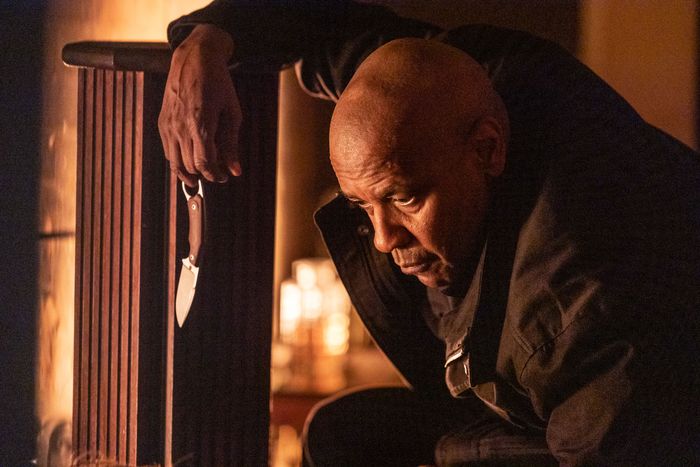
Robert McCall, the character played by Denzel Washington for three movies now, is a pathologically American action hero. He’s retired from his job for the DIA, but he still works — at a Home Depot–esque hardware store, or as a Lyft driver — just to have something to do. He knows that violence is always the answer, for all that he occasionally seems to want to atone for a life spent as a government assassin. And he has a feeling he could have a better, more fulfilling life in Europe — say, somewhere on the Amalfi Coast, which is where he finds himself in The Equalizer 3 after exterminating a bunch of baddies in Sicily and then passing out from blood loss after driving off the ferry. Before you can say “prego,” Robert has been taken in by the residents of an idyllic small town who spend their days hanging out in the piazza, navigating the narrow streets up and down the hills, and eating authentic food down by the waterfront. What weary American, accustomed to a life of big-box stores and gig work, wouldn’t be charmed by the opportunity to while away the hours at a table at an outdoor café instead of one in an all-night diner? All Robert has to do is slaughter a few dozen members of the Camorra who are terrorizing the place.
According to Antoine Fuqua, who has directed all three big-screen Equalizers, this third effort will be the last in the series for him and for Washington. It does feel like a story that’s run out of places to go, an issue that crossing the Atlantic doesn’t remedy. When your main character is such an incredible killing machine, there’s little mystery about what’s going to happen or whether he’s going to succeed, and The Equalizer 3 barely even tries to pretend that Robert will have trouble going up against the organized criminals who want to seize local assets for themselves. The only suspense comes from the question of whether Robert will stay in Italy, where he stumbles into incredible housing with the kindly doctor, as well as a possible love interest, and finds some instant community from everyone else nearby. Fuqua gives the film a gray-blue action-movie wash that seems intended to emphasize his main character’s seriousness, and it still can’t overcome the absurd beauty of the setting. At a certain point, after Robert’s finished recovering from his wounds, he packs up his bags as though ready to leave, and you want to scream, “No, for the love of God, why would you ever want to go back to Boston?” Fortunately, Robert’s presence is required for some equalizing on an international stage.
The Equalizer 3 has a worn-out haphazardness to it that extends to a story line involving a junior CIA agent played by Dakota Fanning, a whole plot thread that could be snipped without any effect on the movie except to maybe leave it under standard feature length. Still, it delivers the goods, thanks to Washington’s performance and Fuqua’s zest for going graphic. The Equalizer series falls into the still-thriving subgenre of older-man action movies dominated by Liam Neeson, but Washington actually plays his character like a weird uncle who just happens to be incredible at murder. He makes endearingly odd choices for a major movie star, biting his lip to scrunch his mouth to the side, putting an emphatic T at the end of an exclamation of “touché,” and letting out a “booOOOoo” when told by Fanning’s character that a search of his name reveals he’s effectively a ghost. He doesn’t come across as a guy who’s searching for redemption after years of brutality but as a local oddball who’s just looking for a place to drink his tea in peace.
Peace isn’t easy to come by, though the motorcycle thugs who swing by to bully the locals and squeeze money out of the businesses don’t offer much resistance. Nor do the mobster higher-ups they report to, who soon find their snapped bones protruding through their flesh and the muzzles of their guns smashed into their eye sockets. The violence in the movie is so gleefully over-the-top, and so effective at solving issues, that it verges on comedy. But the funniest thing about The Equalizer 3 is that the Camorra’s end goal is to intimidate people into giving up their property so that the gangsters can build hotels, casinos, and other tourism-related businesses. Robert is not just fighting on behalf of the people of his impossibly charming Italian town; he’s inadvertently fighting to keep the place unspoiled and free of development. To try to achieve the idealized vision of living abroad, with yourself as the only outsider — isn’t that just like an American?
More Movie Reviews
- The Accountant 2 Can Not Be Taken Seriously
- Another Simple Favor Is So Fun, Until It Gets So Dumb
- Errol Morris Has Been Sucked Into the Gaping Maw of True Crime


